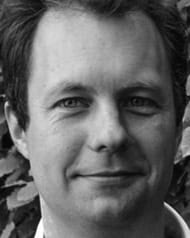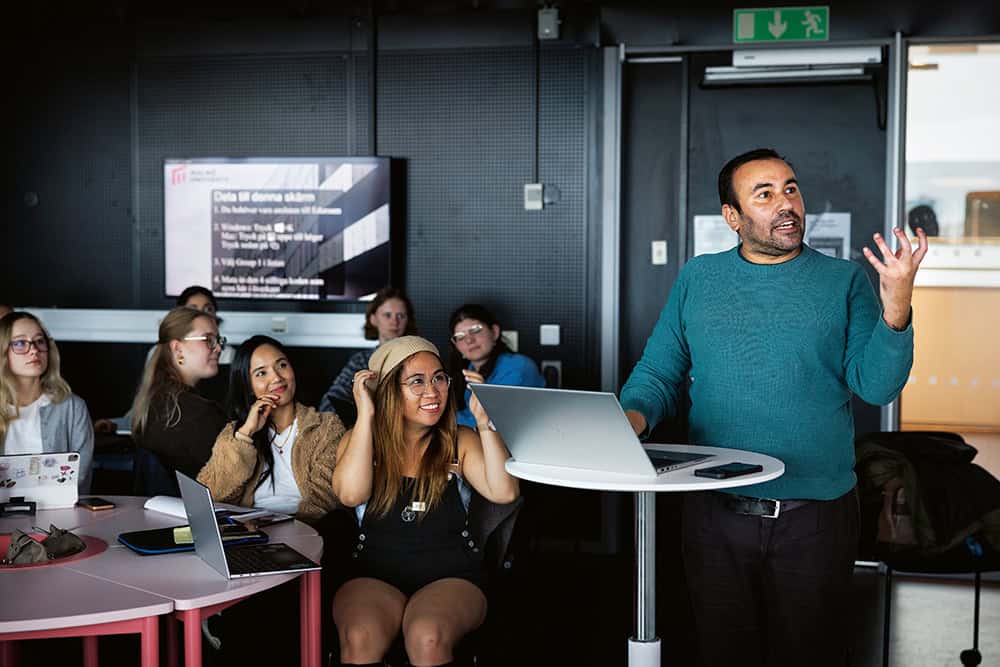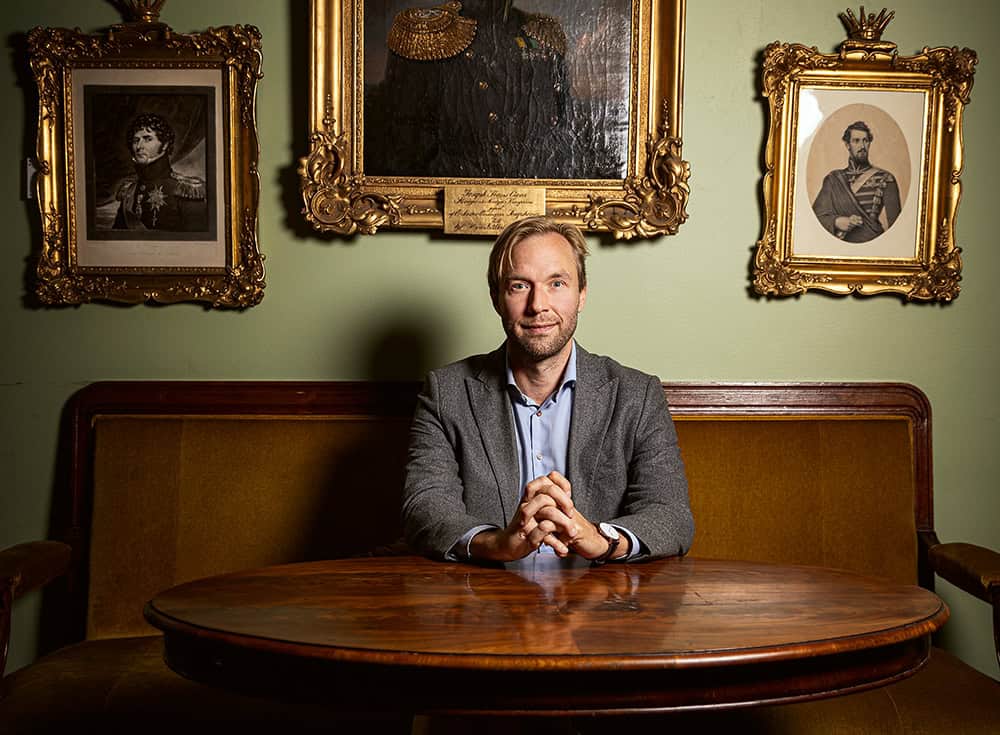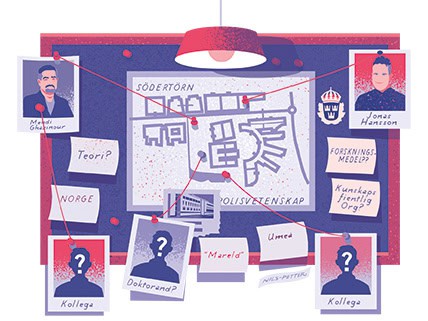Just under half, 43 per cent, of the members who responded to the survey conducted by Saco-S in Lund believe that their pay rises can be attributed to the factors that are supposed to influence salary development.
“We know that members are not particularly fond of this method,” says Adam Brenthel, chair of the Saco-S association at Lund University. “And we also know that some members have left us for other unions to avoid having salary-setting dialogues.”

Adam Brenthel
Chair of the Saco-S association at Lund University
He describes how members report feeling resigned and frustrated about not being able to influence their salaries. They feel at the mercy of a manager who decides unilaterally on the level of their pay increases.
The survey was sent to 3,682 members. As doctoral candidates are paid a flat-rate salary, they were not included in the sample surveyed. More than a third of the 1,086 respondents reported either that they had not had a follow-up meeting after their development dialogue or that they could not remember whether there had been a follow-up meeting.
“The three-step model comprises a development dialogue, follow-up and then a salary-setting dialogue,” Brenthel explains. “If the second step, where you can actually discuss the assessment of your performance, doesn’t work, then the decision about your new salary level won’t seem justified either.”
Ahead of the SULF Congress on 21-22 November, the local SULF association in Lund has also submitted a motion for SULF to push for the local parties to be able to opt out of salary-setting dialogues.
“After 8 years of hard work at the local level to make the central agreement work, we have only succeeded in helping to give the employer all the power over salary setting and undermined our own influence,” they write in the motion.
Brenthel’s view is that the local trade union association in Lund has tried everything possible to make the central collective agreement work.
“But I think, or actually I know, that the members and local elected representatives often think we should have another solution. This survey also clearly shows that,” he says.
Marie Härstedt, HR Director at Lund University, has only seen a summary of the report and tells us that the local union has not yet requested a dialogue on its content.
In general, she thinks salary-setting dialogues is a method that works well.
“We have few disagreements, and I think that can be regarded as a measure of quality. We work on the basis of the current collective agreement, which states that salary-setting dialogues should be the primary method unless otherwise agreed by the local parties. We have been in agreement about this for a long time.”
“The term salary-setting dialogue is pretty misleading. It is more like salary-setting information.”
From a free text response from a survey of Saco-S members in Lund
However, the fact that just under half of the respondents believe that their salary increase can be attributed to salary-influencing factors shows that there is room for improvement, says Härstedt.
“The purpose of the salary-setting dialogue is to provide a fact-based explanation of your new salary and for you to understand why you have that salary. It’s a dialogue between the salary-setting manager and the employee, and we think it’s important to talk to each other. Not just through this model, but in general. This (the results of the survey, ed.) points to the need for dialogue, and I think that’s good.”

Marie Härstedt
HR Director at Lund University
The HR director also identifies the management structure within higher education as a challenge, with large groups of employees and some managers being elected by their peers.
“I think that the conditions for getting it all done are challenging. That is something that we talk about. And I think there are several other elements to this as well.”
That the survey shows that members perceive wage setting as one-sided on the part of the employer is to some extent due to people’s expectations when it comes to the salary-setting dialogues, says Härstedt.
“It’s not a negotiation, but sometimes there are expectations that it’s supposed to be. Nor should the employee’s negotiating skills be a decisive factor in determining their new salary. However, they should be able to understand the reasoning and have the decision explained to them.”
“Since everything just follows a template, you might as well not bother with the dialogues. It’s not good for your health when it’s all a game and play-acting.”
From a free text response from a survey of Saco-S members in Lund
The SULF local associations in Linköping and Umeå have also submitted a joint Congress motion calling on the union to work towards a new salary review model.
“Our thinking is that this model has been in place since 2010, and everything has a best-before date,” says Per Lundgren, chair of the SULF association at Umeå University. “We need to prepare for the future and at least investigate alternatives without having any preconceived ideas.”

Per Lundgren
Chair of SULF Umeå
In Umeå, most of SULF’s members do not have salary-setting dialogues. The model is used mainly for people in management and administration positions. Until 2016, there was an exception to the model. Since then, salary-setting dialogues have been introduced gradually in the departments, says Lundgren.
“There needs to be an organisation in place for it. Managers need to be trained, and if you’re the head of a department of 200 staff, you can’t have salary-setting dialogues with 200 people.”
So far, therefore, it is still primarily the traditional union salary negotiation model that is used in Umeå. Lundgren’s view is that not many people, either members or heads of department, want to have salary-setting dialogues.
In their joint motion, the two local associations describe how salary-setting dialogues drain resources and undermine the union.
“The union has negotiated away its strongest card. Both for me personally and from what I hear from other members, it feels like people are almost always dissatisfied,” said David Rule, chair of SULF Linköping in an earlier interview in Universitetsläraren.

David Rule
Chair of SULF Linköping
The two local chairs do not want to discuss what model should be introduced instead.
“We can leave that open,” says Per Lundgren. “What is important is to start thinking about other ways and seeing if there is another model. That does not necessarily mean that we should go back to the previous way.”
“If it doesn’t change, I will leave the union, which in practice will mean a pay rise.”
From a free text response from a survey of Saco-S members in Lund
Adam Brenthel, from Saco-S in Lund, also wants to leave this question open. In order to answer the question of which model should replace salary-setting dialogues, there needs to be a local process that is broadly supported by the different local trade union associations. However, the survey shows what the members think, he says.
“If they have a choice, our members don’t want to have salary-setting dialogue, regardless of whether the process works or not, because the method is not suitable for a higher education institution.”
The findings of the union’s survey
43 per cent of the 1,086 members who responded to a survey by Saco-S at Lund University believe that their pay increases are attributable to the factors that should affect their pay.
51 per cent of the remainder perceive their salary adjustment as a standard increase or as a monetary increase that is not set individually.
12 per cent of respondents reported that they had not had a salary-setting dialogue in 2023.
34 per cent reported they have not had any follow-up after their development dialogue.
The questionnaire was sent to 3,682 members of Saco-S at Lund University.





















